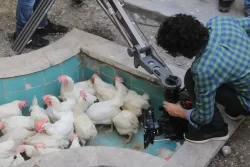Would you change races if you could? Confucius says, “honor thy mother,” but at what cost? Asian identity is constantly changing, whether it is the questioning of gender norms in the motherland or grappling with racism in the diaspora.
Here are some of the situations and stories that these questions have manifested into.

(Image Credit: Kyle Lau)
WHITE NOW PLEASE
Watched by: Charlotte Wittmann
Bryan wishes that he was cast as the superhero in his school play, rather than being relegated to an offensive and stereotypical Asian supporting character. When he expresses this to one of his white classmates, she looks him up and down and responds, “You don’t look like a superhero, like, at all.” It is clear that Bryan’s white classmates don’t understand, or wish to understand him at all. They mock his culture and race throughout the film; yelling, “Japan!” when they see him, even though he is not Japanese. They mistake his dumplings for sushi, and call them disgusting.
When Bryan is offered a “race exchange” — a medical procedure that would allow him to change races — he must decide if being white will make his life better. Kyle Lau (writer and director) explores the intricate dichotomy of hating your oppressor while simultaneously wanting to be them.
FISH
Watched by: Chen-Yi Wu
Your mom catching you masturbating to “the hottest U.S. president” is already quite embarrassing — the only way it could get weirder is if she were a fish! “Fish,” directed by Jeremy Hsing, is a mother-and-son drama floating in an ocean of queerness. Tiger (Patrick Zhang) carries the weight of unresolved issues with his mother, who passed away. However, fate takes an extraordinary turn when his mother returns to him in the form of a fish, seeking to untangle the emotional knots that bind them. Against the backdrop of escalating hatred towards the Asian community and stigmatization since the pandemic, Hsing subtly uses humor to comment on the objectification faced by AAPI and LGBTQ+ individuals, cleverly challenging perspectives from a reverse white standpoint. You think it’s gross to desire white, male politicians, but how is that different from searching Asian fetish porn on the internet?
Even as a fish, Tiger’s mother continues to be a mother, and their emotional conflicts persist. In a cathartic moment, Tiger finally expresses his frustrations to his aquatic parent, seeking autonomy and understanding: “Things will just be so much easier if you can let me have something for myself,” he proclaims. The silence of the fish throughout the rest of the film sparks curiosity. Perhaps her return was intended to draw out Tiger’s unspoken truths, the words he hesitated to convey while she was alive. In the final scene, as Tiger observes the decorations for the fundraising campaign his mother had planned, one can’t help but wonder if her fish incarnation serves as a reminder, urging him to reconcile and fully embrace motherly love.
THE STRANGER
Watched by: Helen He
Sometimes, change in a relationship is not for the better. In “The Stranger,” a short written and directed by Tin Pak Lau, Jackie wrestles with her relationship with her lover, Ray, after Ray wakes up one morning inhabiting a stranger’s body. We see Ray’s (Curtis Lum) struggle in accepting his new appearance and revealing himself to others, as well as Jackie’s (Yvonne Chapman) reluctance to engage with him romantically, unable to see past his appearance even after agreeing to an attempt on a night out. Throughout the film, Ray’s original appearance floats and flits by, representing Jackie’s memories of him and their times together. As Ray continues to change in unexpected ways, Jackie finds herself answering a difficult question – how much of the new Ray is she willing to accept? The strength of Jackie and Ray’s relationship is tested – but as Albert Camus once said, “The realization that life is absurd cannot be an end, but only a beginning.”
A ROADSIDE BANQUET 鸡毛掸子
Watched by: Chen-Yi Wu
“A Roadside Banquet” stands as Chinese director Peiqi Peng’s poignant critique of the one-child policy and entrenched patriarchal traditions. The story revolves around Mai (Sarah Zhai), a 10-year-old elder sister, who joins in celebrating her younger brother Di’s (Spencer Su) first birthday with family and friends. For Mai’s parents, Di’s birth – the emergence of a baby boy after the one-child policy has finally eased up – is a momentous event. During the festivities, a thought-provoking question arises while Mai plays with her cousins. “If you and I fell into the water, who do you think the adults at the table would save first?” Mai asks the adults this with complete confidence, expecting them to prioritize her safety. However, their attention is focused on Di, leaving Mai with an ambiguous response. Later, at her parents’ table, a revelation shakes Mai to her core. Her mother discloses that, upon Mai’s birth, her father was disappointed and left speechless because she was a girl. The weight of her father’s guilt-ridden eyes pushes Mai to tears, fostering a belief that she is unworthy of love compared to her younger brother.
The Chinese title of the film, “鸡毛掸子 (Duster),” directly alludes to the status of girls in modern Chinese families. Just like a duster, an overlooked household item, Mai is silently relegated to the background, unrecognized as the central figure in her family. This portrayal serves as Peng’s incisive critique of Chinese patriarchal ideals, highlighting the objectification and devaluation of girls in society. Amidst the disheartening reality, a ray of hope shines through Di’s character. Unlike others who have been shaped by patriarchal norms, Di exhibits empathy and compassion. During the one-year-old catch, a Chinese ritual in which the child’s choice of object placed in front of them signals their potential personality and future, he reaches out and holds his sister’s hand, demonstrating his recognition of Mai’s true value. Amidst a table filled with wallets, lighters, and various objects, Di discerns that the real treasure lies in the duster — Mai, his beloved sister.

(Image Credit: Mohsen Ghezelsoflou)
HEN-FATUATION (AMORGH)
Watched by: Helen He
Mohsen Ghezel Souflou’s short, “Hen-fatuation (Amorgh),” explores an intense new relationship between a man and a hen. The protagonist, Sadegh (Hossein Monfared), struggles with his feelings of lack of acceptance by the people around him, including his estranged wife (Negar Salahshoor), as his increasingly bizarre behavior alarms his neighbors. Sadegh only wishes to live his life the way he chooses, free from external judgment. However, his wife and others seem to only get in the way. Will his new partner, a randomly chosen hen, be the support he needs? Shifting points of view throughout the film heightens tension and provides an intimate look into the personal life of a man so impassioned by love and longing, he is willing to risk it all.
THE 25TH FILIAL EXEMPLAR
Watched by: Charlotte Wittmann
“The Twenty-four Filial Exemplars,” written by Guo Jujing, is a classic Confucian text that outlines how to be a good child. However, it goes beyond simply honoring thy mother and father and emphasizes that children should take care of their parents, even at the cost of their own happiness.
Director and writer Leon Cheo shows just how constrictive and devastating these filial expectations can be for a child. Leung, the protagonist of “The 25th Filial Exemplar,” dresses up as his late sister to try to help his mother process her grief. He wears a wig and tries to recreate her voice and mannerisms. It is a beautiful and heartbreaking visual representation of a son losing himself completely to become someone his mother will love. The framing of the shots pairs with the harmonic dissonance of the score to create an eerie and psychologically unnerving environment that keeps the audience at the edge of their seat.
The “Metamorphosis” shorts block screened at the 46th Asian American International Film Festival.

